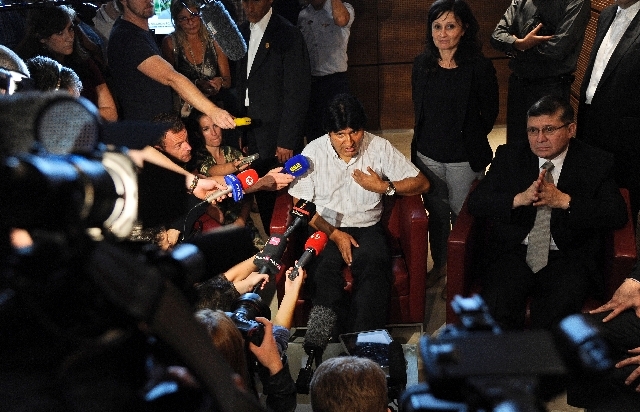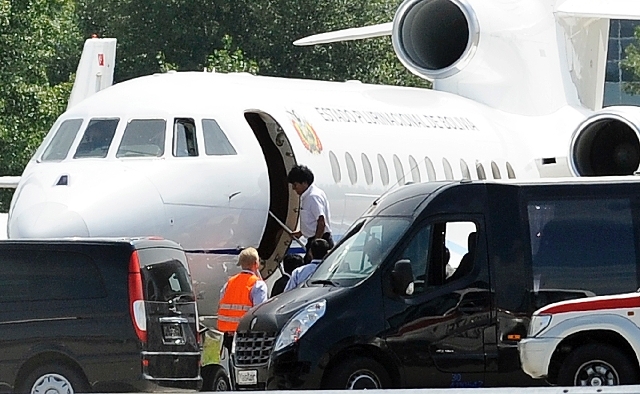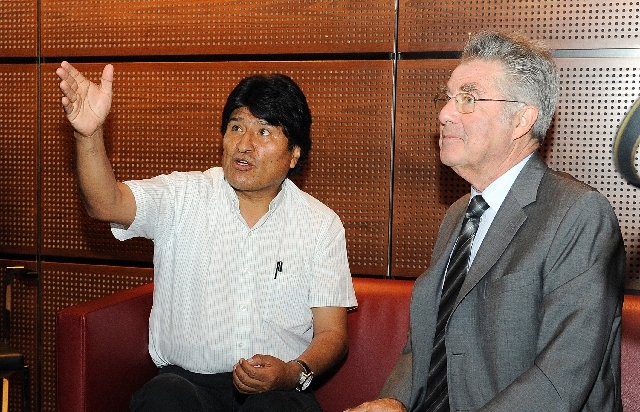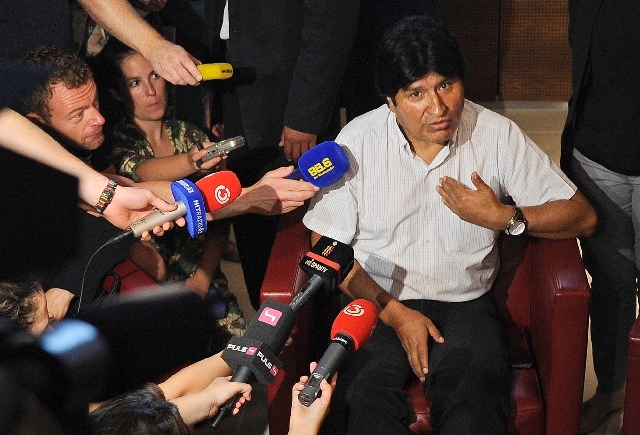Bolivia vs. Europe over Snowden-linked plane delay




LAS PALMAS, Canary Islands — Bolivia’s president left Europe for home on Wednesday in a diplomatic drama after his flight was rerouted and delayed overnight in Austria, allegedly because of suspicions he was trying to spirit NSA leaker Edward Snowden to Latin America.
Bolivia accused the United States of ordering European countries to block President Evo Morales’ flight from their airspace, and accused European governments of “aggression” by thwarting the flight.
However it’s still unclear whether European countries did block the plane and, if so, why. French, Spanish and Portuguese officials all said Wednesday the plane was allowed to cross their territory.
Snowden himself remains out of public view, believed to be stuck in a Moscow airport transit area, seeking asylum from one of more than a dozen countries.
Bolivia’s president sparked speculation that he might try to help Snowden get out during a visit to Russia after he said that his country would be willing to consider granting him asylum.
The plane carrying Morales home from a Moscow summit was rerouted to Vienna on Tuesday night, adding a new twist to the international uproar over Snowden’s revelations of widespread U.S. surveillance. The plane took off again shortly before noon Wednesday after sitting overnight at the airport.
The emergency stop in Austria may have been caused by a dispute over where the plane could refuel and whether European authorities could inspect it for signs of Snowden.
Austrian officials said Morales’ plane was searched early Wednesday by Austrian border police after Morales gave permission. Bolivian and Austrian officials both say Snowden was not on board.
Morales’ aircraft asked controllers at Vienna airport to land because there was “no clear indication” that the plane had enough fuel to continue on its journey, an official in Vienna said. The official demanded anonymity because he was not authorized to go public with the information.
Bolivian officials said that France, Portugal and Italy blocked the plane from flying over their territories based on unfounded rumors that Snowden was on board. Its ambassador to the United Nations, speaking in Geneva on Wednesday, continued to insist that several European countries had refused permission for the plane to fly in their airspace.
Sacha Llorenti said it was an “act of aggression” and that the four countries violated international law. Llorenti said “the orders came from the United States” but other nations violated the immunity of the president and his plane, putting his life at risk.
There was no immediate U.S. response to Llorenti’s accusation.
In Washington, the State Department would not comment directly Tuesday night. Earlier Tuesday, department spokesman Patrick Ventrell would not discuss how the Obama administration might respond if Snowden left the Moscow airport. “We’re not there yet,” he said.
French President Francois Hollande, speaking at a press conference in Berlin, attempted to clear up confusion about whether or not France had refused Morales’ plane access to its airspace.
“There was contradictory information about the identity of the passengers aboard one or two aircraft, because there was also a doubt about the number of planes that wanted to fly over France,” he said. “As soon as I knew that it was the plane of Bolivia’s president, I immediately gave my authorization for the overflight.”
The Portuguese Foreign Ministry said in a statement Wednesday that Portugal had granted permission for the plane to fly through its air space but declined Bolivia’s request for a refueling stop in Lisbon due to unspecified technical reasons.
Italian officials were not available to speak on the subject.
Morales’ plane was on the last leg of its journey Wednesday evening after it made a refueling stop in a military section of the main airport in Las Palmas on Spain’s Canary Islands, off the western coast of Africa.
Earlier, Bolivia said Spain agreed to allow the plane to refuel in the Canary Islands — but only if Bolivian authorities allowed it to be inspected. Spanish Foreign Minister Jose Manuel Garcia-Margallo denied Wednesday that his country demanded an inspection.
Speaking in Berlin, Spanish Prime Minister Mariano Rajoy said authorization was given for the plane to stop and refuel in Spain’s Canary Islands but that it was important Snowden was not aboard.
While the Bolivian presidential plane sat in pre-dawn darkness on the tarmac in Vienna, a surreal scene played out when Spain’s ambassador to Austria visited the airport to meet with Morales, the Bolivian president told reporters Wednesday.
The ambassador, Alberto Carnero, asked Morales if they could board the Bolivian plane together.
“He asked me to go have a coffee inside the plane to see the plane,” Morales said.
Morales added that he believed the request was made so the plane could be inspected.
“I could not permit the plane to be searched because I am not some delinquent and because this is an official plane. The president has inviolable immunity,” he said.
Morales also said the ambassador pledged to give an answer about whether the plane could fly over Spain after 9 a.m. Wednesday, saying he had to consult “with friends.” Morales said they were “friends of Spain” but he did not know who.
Morales said he never saw Snowden and that Bolivia has not received a formal request for asylum for him. The country would consider a request if it receives one, Morales said.
Leaks by Snowden, a former NSA systems analyst, have revealed the NSA’s sweeping data collection of U.S. phone records and some Internet traffic, though U.S. intelligence officials have said the programs target foreigners and terrorist suspects mostly overseas.
Snowden has applied for asylum in Venezuela, Bolivia and 18 other countries, according to WikiLeaks, a secret spilling website that has been advising him. Many European countries on the list — including Austria, Finland, Ireland, the Netherlands, Norway, Spain and Switzerland — said he would have to make his request on their soil.
EU Transport spokeswoman Helen Kearns said it is up to national governments to allow or refuse planes entry into their airspace. She said it’s unclear what happened with the Bolivian plane and whether or not it was refused access and why.
———
Charlton reported from Paris. Sylvie Corbet in Paris, Ciaran Giles and Alan Clendenning in Madrid, George Jahn in Vienna, John Heilprin in Geneva, Raf Casert in Brussels and Barry Hatton in Lisbon, Portugal, contributed to this report.












